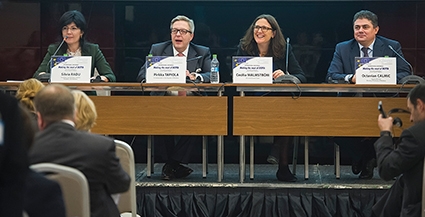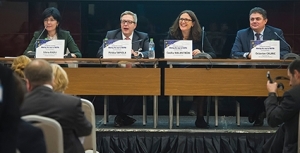Navigating the EU Integration Process
In a conference entitled ‘Making the Most of the DCFTA,’ within the framework of the Visegrad Fund project ‘Sharing Experience of Public-Private Dialogue in EU,’ the Policy and Management Consulting Group (PMCG) hosted high ranking representatives of the Moldovan and Georgian governments, the EU delegation, Hungarian, Polish, Czech and Slovakian diplomatic missions and representatives of EBRD, EIB, USAID, WB, and IFC in Chisinau, Moldova on October 22-23. The aim was to discuss the most efficient ways for governments and private sectors to navigate through the EU Integration Process, more specifically, to assist Moldovan and Georgian businesses and government bodies to strengthen dialogue and awareness about the opportunities and challenges presented by the signing of the Association Agreement.
Cecilia Malmstrom, EU Commissioner for trade; Luc Devigne, Head of the EU Commission unit Russia, CIS, Ukraine, Western Balkans, EFTA, EEA and Turkey; Archil Karaulashvili, Deputy Minister on European and Euro-Atlantic Integration of Georgia; Aleksi Aleksishvili, Former Minister of Finance of Georgia, CEO- Policy and Management Consulting Group - PMCG (Georgia) and other high-ranking officials shared their experience and opinions regarding the process of EU approximation.
The focus of the event was on sharing the experience of the Visegrad countries (Czech Republic, Hungary, Poland, Slovakia) in developing constructive public-private dialogue in a transition period, while harmonizing legislation and standards with those of the EU. Key topics discussed were ‘One year of the DCFTA,’ ‘external assistance for SMEs to meet the requirements of the DCFTA,’ ‘accessing EU markets,’ ‘building public-private partnerships,’ and ‘providing support services.’
Valerian Gvalia, Senior Adviser of EU-Georgia Business Council: “The EU-Georgia Business Council (EUGBC), the only European Business Association in Georgia, pays paramount attention to experience sharing with its business colleagues. Indeed, joint efforts from Eastern Partnership member states are necessary in order to move forward towards the benefits of the Association Agreement and DCFTA. The International Conference in Chisinau ‘Making the Most of the DCFTA’ proved once again that there is interest from the Georgian side to enhance the trade relationship with the EU.”
Georgia Today spoke with Nino Samvelidze, EU Programs Manager of PMCG, about some of the topics covered in the conference.
What key achievements and challenges were highlighted on completion of the first year of the DCFTA in Moldova and Georgia?
Both Moldova and Georgia started implementation of the norms and recommendations set out by the AA and DCFTA which also includes legal approximation of different sectors. The approximation process creates opportunities for economic advancement of the countries but there are several areas which still remain a challenge, one being the capacity and readiness of SMEs to catch up with the process and regulations.
The DCFTA has large political meaning for these countries and its proper implementation is important. At the same time it is essential not to sacrifice business interests to accelerated implementation of the DCFTA, namely approximating legal and institutional framework while disregarding business needs and interests.
The Moldova conference stressed that another challenge is possible increased imports from the EU and additional pressure on domestic producers, especially in the short run. This, together with increased costs due to strict compliance requirements with EU standards, might be a trial for the economy. This is why assessing the countries competitive advantage is important; targeting the most promising fields in the short-run which might have spill-over effect and useful gains in the future. Special attention should be paid in correctly utilizing the technical and financial assistance provided by the EU, EBRD, EIB and others so they bring tangible results.
One of the challenges for SMEs in these countries is the lack of available and cost effective advisory services, lack of interregional and international mechanisms to exchange best practice, as well as a lack of internal funding due to underdeveloped capital markets and a financial sector still in transition. For this, Georgia, Moldova and Ukraine need to develop local expertise capacity to provide cost effective advisory services to SMEs, facilitate exchange of best practice, and improve access to funding for SMEs to foster economic development
What kind of assistance / support has been offered to SMEs in Georgia and Moldova in particular?
The European Commission - jointly with the European Investment Bank (EIB) and the European Bank for Reconstruction and Development (EBRD)– has put in place the DCFTA Facility for SMEs. The DCFTA Facility for SMEs is an integral part of the SME Flagship Initiative, a wide-ranging regional initiative of the EU which aims to provide support to SMEs in the Eastern Partnership to tackle the challenges impeding them from reaching their full potential. The Facility will complement the EU programs in each country that help small businesses grow and prepare for the new market opportunities of the DCFTA and help national authorities to implement their Association Agreements.
The DCFTA Facility for SMEs will receive approximately €200 million of grants from the EU budget. This contribution is expected to unlock at least €2 billion of new investments by SMEs in the three countries, to be financed largely by new loans supported by the Facility.
The funding will:
• Help SMEs to seize new trade opportunities with the EU and within the region which have been opened up thanks to the DCFTA;
• Improve access to finance for SMEs, enabling them to make the necessary investments to increase their competitiveness;
• Allow SMEs to integrate into global value chains by becoming business partners of foreign direct investors;
• Enable SMEs to comply with new sanitary, phytosanitary, technical and quality standards, as well as with environmental protection measures, thereby benefiting local customers and boosting exports to the EU and beyond.
Katie Ruth Davies











